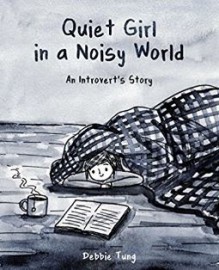
"At least one-third of the people we know are introverts. They are the ones who prefer listening to speaking, reading to partying; who innovate and create but dislike self-promotion; who favor working on their own over brainstorming in teams. Although they are often labeled "quiet," it is to introverts that we owe many of the great contributions to society--from van Gogh’s sunflowers to the invention of the personal computer.
Passionately argued, impressively researched, and filled with indelible stories of real people, Quiet shows how dramatically we undervalue introverts, and how much we lose in doing so."
-❖-❖-❖-

Say the word introvert and many people envision an antisocial loner hiding from the world. In Quiet: The Power of Introverts in a World That Can't Stop Talking, author Susan Cain dispels the myths and negative connotations associated with the word introvert. As she explains, the “word introvert is not a synonym for hermit or misanthrope. Introverts can be these things, but most are perfectly friendly." Cain also tackles what it means to be an introvert in an American culture where being an extrovert is the ideal.
The book highlights various findings of research and studies. One such finding is that introverts tend to be more sensitive to stimulation than extroverts, which I think leads to the stereotype of being antisocial. It’s not that introverts are particularly antisocial, it’s just that they find an abundance of stimulation draining. Where an extrovert needs to recharge by being social, introverts need time to recharge by spending some time alone.
There was also a section offering advice for introverts on how to work in open space, team oriented business environments, which has become incredibly popular within the last twenty years, as well as advise for managers and business owners on how to create an environment that brings out the best of both introverts and extroverts. Cain points to studies that indicate the fallacy of open space environments being conducive to productivity and creativity. They have the opposite effect. Cain also includes a section for teachers and parents on working with introverted children.
Despite these interesting tidbits, I found Quiet disappointing. I’m not sure what I was expecting, but I thought it would delve a little deeper. Much of the book felt sort of “surface” and shallow. A large portion felt like filler. The book was organized by topic, but it felt as though she jump around too much, which I think had the effect of making it feel as though she was glossing over things and not delving deeply.
I also thought the section related to various Asian countries was overly broad. Instead of differentiating between them, she just lumped everyone under the umbrella of “Asian”. I get that she was trying to compare the Asian experience and culture with the American extrovert culture, but it would have been far more interesting if she had discussed introversion and extroversion from within the various cultures while also comparing their experiences east vs. west. Don’t get me wrong, it was interesting to read how the American culture of extroversion is perceived, but it could have been handled better.
So, while Quiet offers interesting insight into the world of the introvert, overall I found it to be disappointing. While I still definitely think it's worth a read, I would recommend borrowing it from a library.
Final rating: 3 stars


 Log in with Facebook
Log in with Facebook 









